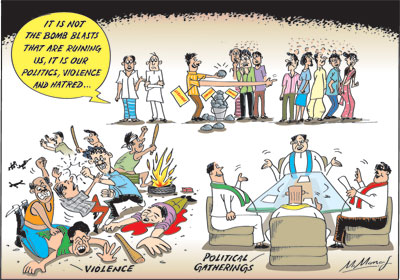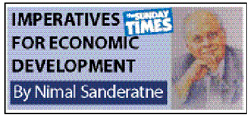Columns
The economy in the first and second half of the year
View(s): Looking back at the first half of the year that is behind us, and the second half of the year before us, this year is likely to be another year of low economic growth and much hardship for a majority of the people.
Looking back at the first half of the year that is behind us, and the second half of the year before us, this year is likely to be another year of low economic growth and much hardship for a majority of the people.
The economic recovery after the April bomb blasts is being throttled by the eruption of communal tensions amid a lack of political leadership.
First half
The first quarter of the year, before the horrendous human tragedy, was a period of economic recovery. The first half year’s economic performance was marred by the Easter Sunday’s bomb blasts and subsequent violence, political repercussions and social tensions.
First quarter
The first quarter’s growth of 3.7 percent, though inadequate, was one of the highest in recent years. Agriculture grew by 6.9 percent mainly due to a bumper paddy harvest. This, together with even a low drought affected Yala in the second half, would meet the rice requirements of the country. Paddy output increased by 13.1 percent compared to the first quarter’s output last year.
Other food crop production, too, increased; coconut production increased by as much as 35 percent.
Industry and services
Manufacturing (including construction) that contributed 30 percent to the national output, grew by only 3 percent. Services that contributed about 60 percent to GDP grew by 5 percent. Tourism that has been severely affected by the security situation from the second quarter was a significant contributor to this growth in the first quarter.
 Second quarter
Second quarter
The developments of the second quarter are not as propitious as those of the first, mainly due to the impact of the bombings and subsequent tensions. The last two months of this quarter were a severe setback to the economy.
While agriculture was perhaps the least affected, services was the worst affected. Tourism that was growing at a fast pace and expected to bring in US$ 5 billion may end up US$ 1.5 to US$ 2 billion less than the expected revenue. The hotels and services linked to tourism have been severely affected; so have been the livelihoods of a large number of people.
After the bombings
Many economic activities came to a virtual standstill immediately after the bombings. Business confidence was shattered, foreign investments dried up and the economy slowed down. However, the productive capacity of the economy remained intact.
Prospects
Had the April bombings not resulted in social tensions, there was an opportunity for an early economic recovery. The economic performance in the second half of this year depends very much on the political and social responses to the bombings, rather than the setback to the economy owing to the April bomb blasts.
Repercussions
Although the production capacity of the country remained intact, with agriculture and industry largely unaffected, the post-bombing communal tensions and political uncertainty have eroded the capacity of the economy to revive. It is the aftermath of the bombings that have affected the economy most.
Social tensions
The well-orchestrated attacks in several places and communal tensions disrupted economic activities. Protests, fasts unto death, hate speech and political confusion have impeded the country’s economic recovery more than the immediate impacts of the bombings. Instead of these tensions tapering off, there is a continuous fanning of the flames.
Silver lining
On the brighter side of this otherwise bleak picture is the continuous growth of exports and reduction of imports that have reduced the trade deficit significantly in the first four months of the year.
Export growth
The first quarter’s export growth and import decline continued into April and reduced the trade deficit. This is a significant development as it was the reversal of a long term trend of imports increasing more than exports. Consequently, the trade deficit narrowed to only US$ 2.5 billion in the first four months.
Lower trade deficit
This gives rise to an expectation of a much lower trade deficit this year of about US$ 8 billion, compared to last year’s US$ 10.3 billion. This would in turn increase the prospects of a higher balance of payments surplus this year. However, lower than expected tourist earnings would reduce the benefits of the decreased trade deficit.
Economic expectations
The impact of the bomb blasts, the communal tensions that have erupted since then and the exploitation of these emotions in the run up to the Presidential elections are likely to result in a year of low economic growth and hardships for the people.
Tourism could be revived to some extent with certain travellers taking advantage of the lower hotel rates. However, tourist earnings are not likely to even reach the level of 2017.
Similarly not only foreign investments, but domestic business confidence has been eroded.
Drought
Despite the South East monsoon in the southern part of the country, drought conditions in the North and East of the country would reduce food crop production, unless there is a change in the weather soon.
Manufacturing
Hopefully export manufacturing would continue to expand and the expectation of a lower trade deficit would be realised. Fortunately, manufactures for export, such as garments, ceramics and rubber and leather goods are unaffected,
Summing up
The economy could rebound to an extent in the second half of the year, if there are no repercussions in the form of communal backlashes and communal tensions. However, the developments after the April bombings do not give much hope of such an expectation.
The socio-political milieu and political forces are such that even the emergency regulations are unable to bring these illegal acts under control. Furthermore the prospects of an improvement in the social tensions are unrealistic to expect owing to the impending presidential election, when communal feeling would be roused to gain votes.
Conclusion
It is not only the economic performance of this year that would be affected by the bombings, communal attacks, social tensions and communal disharmony, but the economic growth for many years to come.
Peace and security, social harmony, law and order, the rule of law, political stability and certainty in economic policies and effective implementations are preconditions for long run economic growth and development. These are the conditions that the country is unable to achieve.
A final word
In summing up last year, Neville de Silva in his column, Thoughts from London, and I, in this column, described last year as an annus horribilis.
Although coincidental, the reasoning behind the description was the same. What would we describe this year at year’s end? Another annus horribilis? Or a year more horrible than the last?


Leave a Reply
Post Comment